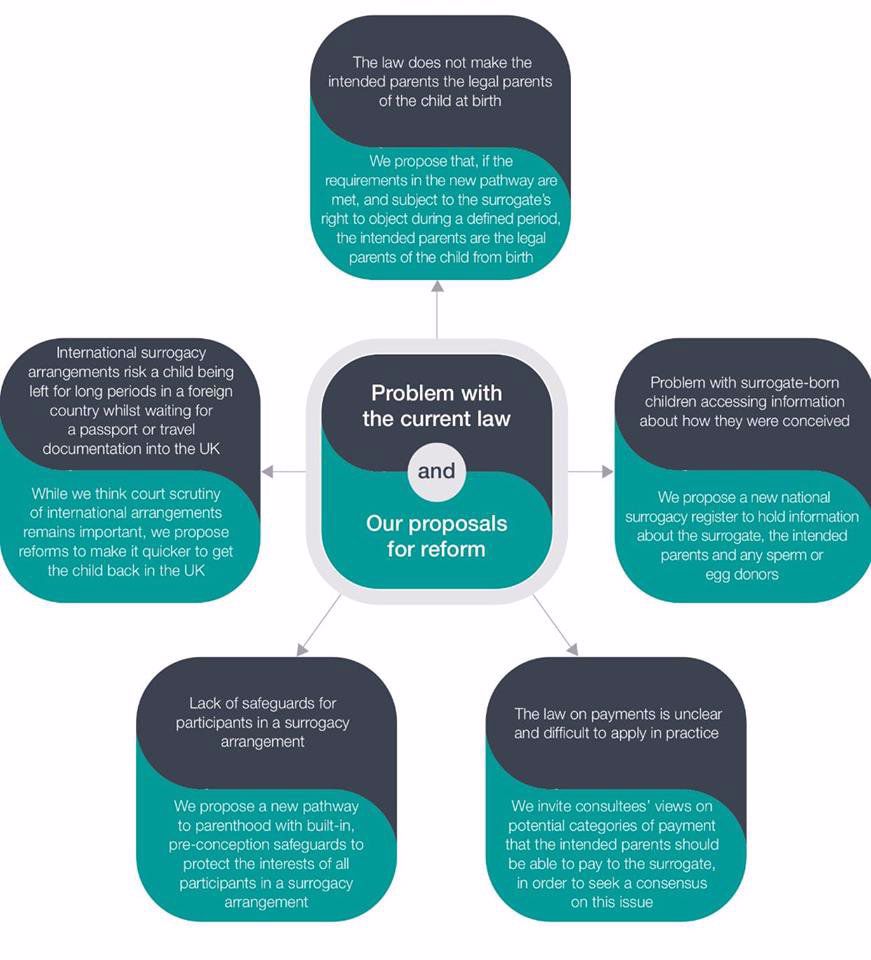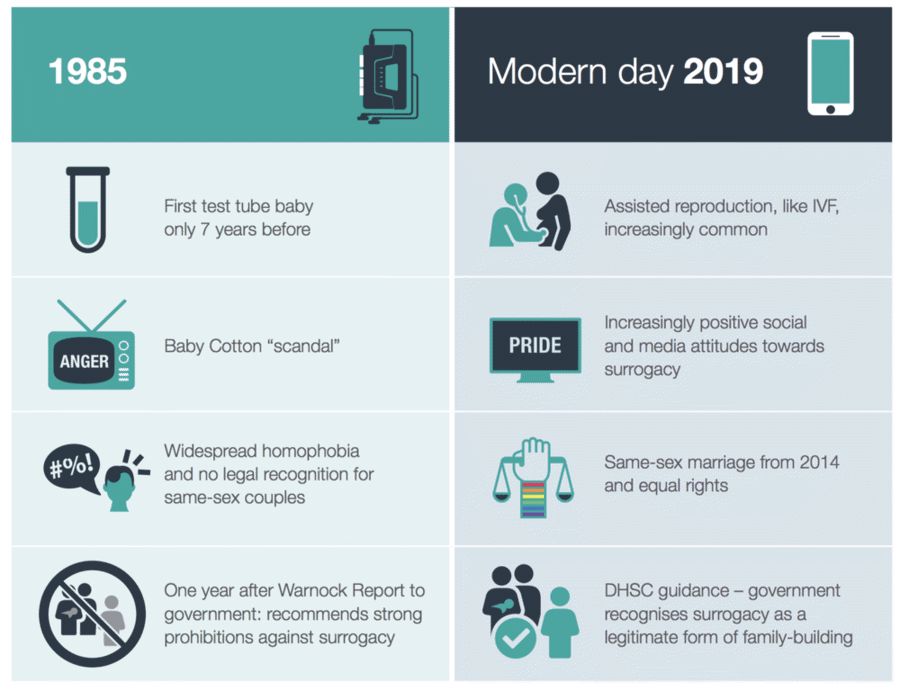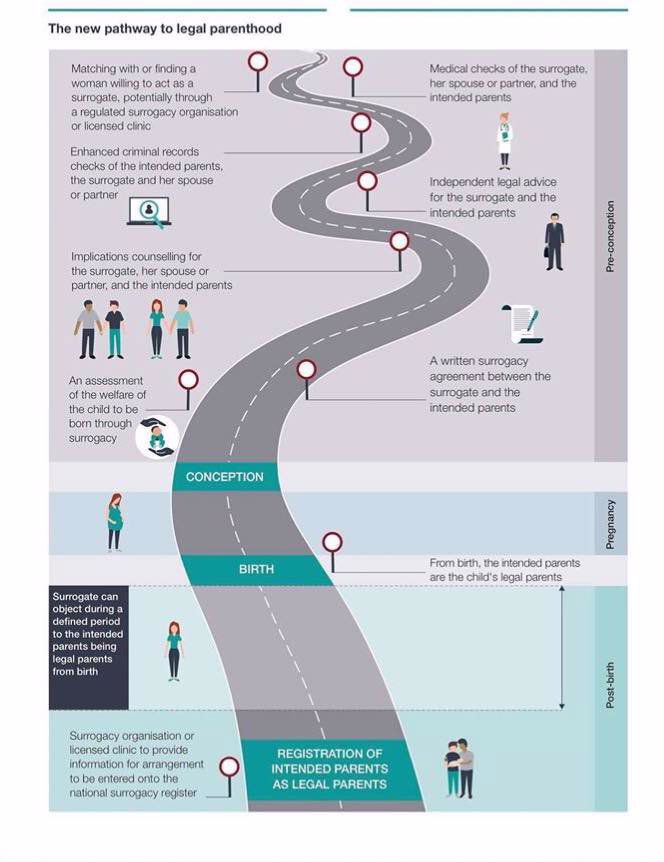As I sit typing this next blog article I’m watching the announcement of our new Prime Minister live on Sky News, and whilst I’m not massive fans of either of the contenders it does somewhat have relevance to this article, as our new PM Boris Johnson and other MP’s will play their part is debating this new law when it finally hits the House of Lords in approximately 2023/2024.
You see, on the 6th June 2019, the Law Commission of England and Wales and the Scottish Law Commission announced their much-anticipated joint consultation paper titled ‘Building Families through surrogacy': a new law, all 475 pages of it. We had the pleasure of hearing the announcement delivered live by Professor Nick Hopkins and his team with 100 other UK Surrogacy experts at an event in London hosted by Dr Kirsty Horsey from the University of Kent. Well, I’ve read the complete document and I’m about to send my feedback as part of the consultation piece. My overwhelming feeling on the document of much-anticipated hope is that it’s one of the most inclusive pieces of consultation I’ve ever read. The team involved in the piece have taken on board so many factors, so many third parties and have been listened to and respected the views of Surrogates and Intended Parents – gay and straight, single and coupled. Altruistic Surrogacy in the UK is perfectly legal, and now widely accepted socially, however commercial surrogacy arrangements in the UK are illegal, so the law has to tread carefully and outline very clearly what is acceptable and what isn’t. As fathers to children born via UK Surrogacy, we are very interested and excited about changes to the current, outdated law.

We were also lucky enough to have been asked to contribute to the APPG (All-Party Parliamentary Group) Surrogacy Law Reform discussions at The Houses of Parliament on October 2018. We were invited as Fathers through UK Surrogacy and they wanted to hear our story and opinions of Surrogacy generally. Some time has passed and the APPG has been a little quiet on releasing an update since their consultation back in 2018 on the law reform which was disappointing, something called Brexit has gotten in the way. *insert eye roll emoji here! However, the saviours at the Law Commission have not disappointed us.
You may be thinking ‘why do we need a new law anyway? What’s wrong with the current one?
So, if you’re sitting comfortably, I’ll highlight some of the challenges with the outdated Surrogacy Arrangements Act 1985, referred to as the SAA 1985. The law on surrogacy is now overdue for a reexamination in light of the societal and medical changes that have occurred during this intervening period. Whilst the concept of family has been fluid throughout history and across cultures, the development of reproduction technology over the past decades has seen significant changes to our understanding of family, parenthood and the creation of life itself.

As Parents, or indeed future parents we take so many privileges for granted when giving birth to a child, for example, the freedom to give birth without several meetings, requests and explanations as to why we’d like to have access to our child when it's born. Safeguarding checks to assess your suitability to parent to your biological child, even being present at the birth can be a challenge for both Intended Parents based on NHS Policy (especially for C-Section births) – which is underpinned by the current laws. Even the exciting job of registering your baby’s birth isn’t without a challenge, especially if your surrogate is married – but even if she’s single, intended parents currently won’t both be listed as your child’s legal parents. Medical consents can sometimes be a challenge too, because if you need to take your child to the hospital in an emergency before your Parental Order is granted, technically speaking you are not legally responsible for giving medical consent, despite it actually being your child – so the surrogate may need to take a call.
Currently under the SAA 1985 Surrogates can only be paid reasonable expenses for carrying a child, the surrogate is recognised as the legal mother once the child is born, and if she’s married her husband is recognised as the legal father – despite neither potentially being linked biologically. The spouse can (if they wanted to) also refuse consent of the parental order, making life very difficult potentially. Bonkers right? That said, cases of dispute are very rare and in over 30 years there have been 5 that have been in the Courts. Surrogates need this protection and law change just as much as Intended Parents do too – a surrogate doesn’t want a child which isn’t theirs (regardless of biology).

The proposed changes take all the above into consideration, the biggest challenge is the legal status of the child born via Surrogacy, this is possible the main one for any of us exploring surrogacy in the UK. Providing your UK surrogacy journey follows a particular treatment pathway, your child will potentially be born with the Intended Parents as its legal parents from Birth. This is often why couples exploring Surrogacy turn to the US for their journey as they are named as legal parents from birth, as it should be. This makes me very happy indeed.
The attached diagram from the Law Commissioners proposal explains the current law and the proposed changes perfectly, and whilst there is still work to do particularly surrounding Surrogates expenses and the impact of parental orders for those on independent surrogacy journeys (especially home inseminations).
So throughout July, August and September The Law Commission and a number of legal firms are hosting a number of seminars all around the UK, and we’re proud to have been asked by the Law Commission directly to be on their parent panel when the events draw to a close in London on the 12th September – before the consultation closes on the 27th September. The full consultation paper is available on their website.





